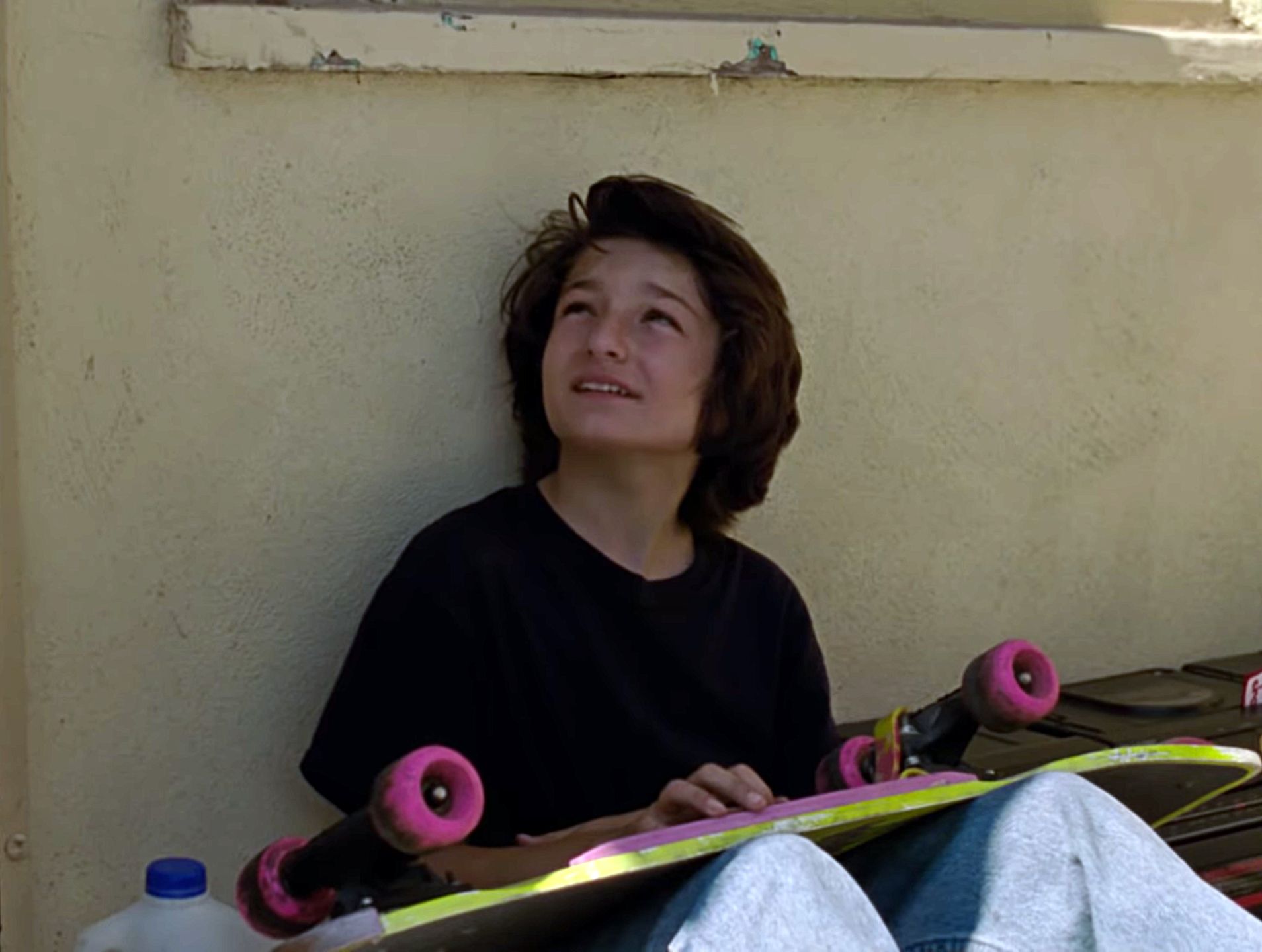After talking to many of the great directors he has now worked for, Jonah Hill decided on a personal project for his first directorial debut. Mid90s is Hill’s tribute to skate culture in California during that time period. For a first feature, Mid90s is pretty good, with Hill nailing all that background and period specific detail that will serve him well for years to come. But maybe next time Jonah, give the script another pass too…
We first meet Mid90s’s young hero, Stevie (Sunny Suljic), as he’s getting his ass kicked by his older brother Ian (Lucas Hedges), while his mother Dabney (Katherine Waterston) wonders about another man she’s considering getting involved with. Yikes, what a crappy home life that is. Desperate for something that isn’t that cesspool, Stevie stumbles upon the free spirited skateboarding boys, and decides those are his people. He strikes up a connection with the other bottom feeder in the group pecking order, Ruben (Gio Galicia), to get in. Stevie then meets other members of the group, the nicknamed ones, Fourth Grade (Ryder McLaughlin) and the amazingly named Fuckshit (Olan Prenatt), who introduce Stevie to filmmaking and partygoing. All of these guys are great, but the role model deprived Stevie immediately sets his sights on Ray (Na-kel Smith), the driven, relatively wise member of the skateboarders whom Stevie is happy to just sit back and listen to.
Mid90s is very much Jonah Hill’s homage to what he sees as a key contributor to the person he has become today. As such, he spends a very large amount of time getting the time period of Mid90s as correct as humanly possible. The strongest contribution is the dialogue, which contains SO many politically incorrect statements that make me feel ashamed to have uttered many of those words. However, uncared for kids would openly use this jargon freely and, as a child growing up in that speech, it’s 100% how kids talked at that time in middle and high school. It’s clear from his promotional junket that Hill wanted the music to be spot on, and the hip-hop focused soundtrack gives the movie an African-American and street beat which ran counter to the mainstream culture and would clearly be the music of the society-averse skateboarders. And, perhaps best, the 90s pop culture references are scattered in discreetly but enjoyably, like a Street Fighter shirt, or the assortment of sports memorabilia, or the cd oriented music listening. Like all great directors, Hill uses the references and period detail to buttress his story instead of be the focal point of it.
The question is: what are all these well textured window dressings helping to prop up? Unfortunately, the answer is a story that is all set up and no pay off. The best parts are in the first half of the movie, when Stevie is learning to navigate the politics of skateboarding hierarchy, and how his new world works. Things like the rule of law are apparently not as relevant, when Stevie figures out after he hops a fence with his new friends. He sees the friendship with the boarders sort of like a ladder, and he has to earn his way to the top to speak to Ray, so he purposely tries jumps that will get him hurt to prove his worth to his friends, alienating the more scared kids like Ruben. I’ve heard Hill call events like this friendship currency, and that is more valuable as well than real money for Stevie, who clearly has found a connection to people he understands and that understand him. So as Stevie works his way up the ladder, we see how conflicts could develop between different group members, setting up a potentially very interesting third act. However, I’m convinced Hill had his closing scene and was intent on using it, which means he’s gotta start sacrificing logic and character to get us to the end he wants. For example, there’s a terrific moment between two characters that could cause a ripple effect across the friend group, but instead of going on the trajectory the movie had us going towards, we backtrack to contrive a situation to get a character VERY injured. That injury was caused by a situation that should land someone in jail, but no cops are to be found so everyone can be together. Hill probably will see this moment upon rewatches, but he can at least be content knowing he can world build and set up as good as any director. It’s just the follow through and payoff he needs to work on next time.
Labors of love are tricky affairs, but in general, it’s hard to make something truly great without sacrificing some of your love for that thing. I’m guessing Jonah Hill will learn that the hard way with Mid90s, and continue to grow as a filmmaker with his next film. Maybe we can get a sequel? The skateboarders need some new members to their team, and the kids from The Florida Project get put in foster homes in California. There’s a crossover no one saw coming!

